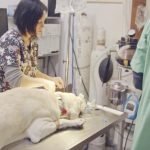Dr. Clayton Greenway discusses how to choose the best food to feed your dog or cat. Other topics covered in this video include options that exist, grains, proteins, food trials, monitoring their stool, contacting the manufacturer, and preventing future medical issues.
TRANSCRIPT:
I’m going to talk to you about what the best food is to feed your dog or cat. I get questions about this all the time and it’s quite confusing for people out there. If you go on the internet and look this sort of stuff up, “What’s the best food?” You’re going to find all sorts of opinions but let me give you some general guidelines to go with.
The first thing is, is that when you look at what’s out there, you can’t just go to the store and buy a bag of food that says dog food or cat food. They’re all marketed in various ways, things that are all natural or no grains.
What’s most important when I’m talking to my clients is that they try a food, every food is always going to be a trial. So if you hear from someone, “Oh you have to feed this,” that’s someone not to listen to because if you get the most fantastic food that’s hand-picked, natural, no grains, some dog or cat is not going to do well on it.
So what you want to do is you want to pick a food that goes with what you think you want for your pet and then try that first. Try it very slowly and move them over to that food very slowly over the course of a week and then you want to monitor them. Particularly their stool quality, make sure they don’t have diarrhea or any problems after eating that food.
Another good idea to do is to contact the company that manufactures the food. You can call them and ask them what studies they’ve done, how many pets they fed it to, whether they’ve used large breeds or small breeds, dogs and cats, and you can ask them what the effect they had on these feeding trials to make sure that it’s right for your pet.
Another thing I like to mention to people is think about your pet and figure out what medical issues it may have in the future and feed a food that’s meant to prevent that. For instance, we know that cats and dogs will get dental disease. You could consider feeding a food specifically designed to prevent tartar accumulation on that pets teeth. If you have a male cat, we know that male cats get blocked from crystals in their bladder. You could feed a diet that is designed to prevent crystal formation in that cat. If you have a large breed dog that you know at some point in its life is going to be more prone to getting arthritis that we know is an issue in those breeds, then you could feed a food that is also supplemented with glucosamine. I like the idea of feeding a food that is specifically designed to prevent a disease that your pet is prone to.
A dog that eats a food, maintains a good weight, eats it well, has solid stools, doesn’t itch or scratch, that’s a good food for that dog. So no one out there is going to be able to tell you what food works for your individual dog, it’s always going to be a trial.
So what’s important is that you pick a food that speaks to you. Whether you want all natural ingredients, whether you want no grains, whether you want a certain percentage of protein from what you’ve found out there, all of these things will have different qualities but really you’ve got to try that food. You’ll find more information on this here at healthcareforpets.com.








